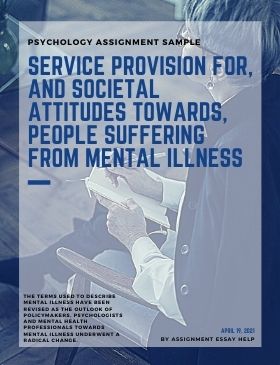
You can download the sample Psychology essay on CUC100 Assignment: Annotated Bibliography with the following question for free at the end of this page. For further assistance with Psychology Assignment help, please check our offerings in Sociology assignment solutions. Our subject-matter experts provide online assignment help to sociology students from across the world and deliver plagiarism free solution with a free Turnitin report with every solution.
(AssignmentEssayHelp does not recommend anyone to use this sample as their own work.)
Psychology Assignment Question
Write an essay of 1000 (+/-10%) words on the following topic:
“Present day Australia is in a good position (compared to the past) with regards to service provision for, and societal attitudes towards, people suffering from mental illness.”
What evidence is there to support this contention? Discuss whether, on balance, this statement is a true reflection of current Australian society.
Psychology Assignment Solution
Mental illness affects one-fifth of the Australian population. Caring for the mentally ill in modern times involves the provision of services rendered by mental health professionals that include psychiatrists and nurses. Service provision in Australia has an added dimension because the needs of people from diverse cultural backgrounds have to be addressed. The social stigma around mental illness is gradually being replaced by a better acceptance of the mentally ill and seeking treatment is less of a social taboo. The transition has occurred due to service provision from institutionalized care to the encouragement of treatment that supports community living. Patients with mental illness can live with their families while undergoing treatment improves their acceptance as members of society.
The terms used to describe mental illness have been revised as the outlook of policymakers, psychologists and mental health professionals towards mental illness underwent a radical change. Illnesses that were earlier termed as idiocy, insanity and lunacy are defined according to the Diagnostic and Statistical Manual of Mental Disorders (DSM). Disorders are classified as depressive disorders or personality disorders or as sexual dysfunctions or adjustment disorders (Sawyer and Savy). Closure of mental asylums through the1990s was an important step in deinstitutionalization and in bringing mental health treatment into the mainstream Australian society (Grace, Meurk and Head). Since 1992, the Australian government has released four mental health plans, that have brought about significant changes (Grace, Meurk and Head). While the 1998 plan brought in the role of General Practitioners and primary healthcare workers in diagnosis and treatment of common disorders, such as anxiety and depression, the 2003 plan focussed on service delivery (Grace, Meurk and Head). The 2008-2013 plan also sought to achieve better mental health outcomes for the indigenous people through culturally sensitive service delivery (Grace, Meurk and Head). Gaps in service delivery in case of the Aboriginals and Torres Strait Islanders still exist because health policy and practice favour standardized methods of care with a bias for Western culture and continue to be deficient in culturally appropriate care.
The increase in expenditure on mental illness treatment in Australia has been a whopping 178% from 1992 to 2016 (Jorm, Patten and Brugha). The recruitment of mental health professionals has increased by 35% in the same period (Jorm, Patten and Brugha). The use of anti-depressants, particularly selective serotonin reuptake inhibitors, has increased by 352% from 1990 to 2012 (Jorm, Patten and Brugha). But the incidence of mental illness has not reduced though service provision has increased (Jorm, Patten and Brugha). The levels of cultural proficiency of mental health professionals with respect to the Aboriginals and Torres Strait Islanders have been poor due to the. Their mental health outcomes remain poor in a system that continues to be fraught with racism. The Western biomedical model of clinical practice has failed in providing culturally competent care to the indigenous people (Doyle, 2012; Durey & Thompson, 2012). Another example of a cultural minority that requires culturally sensitive mental health professionals is the fast-growing Chinese community in Australia that includes ethnicities that speak Mandarin or Cantonese and/or English. The English speaking Chinese community needs to dissipate information about the availability of mental health services (Chan and Ritchie).


 WhatsApp Us
WhatsApp Us